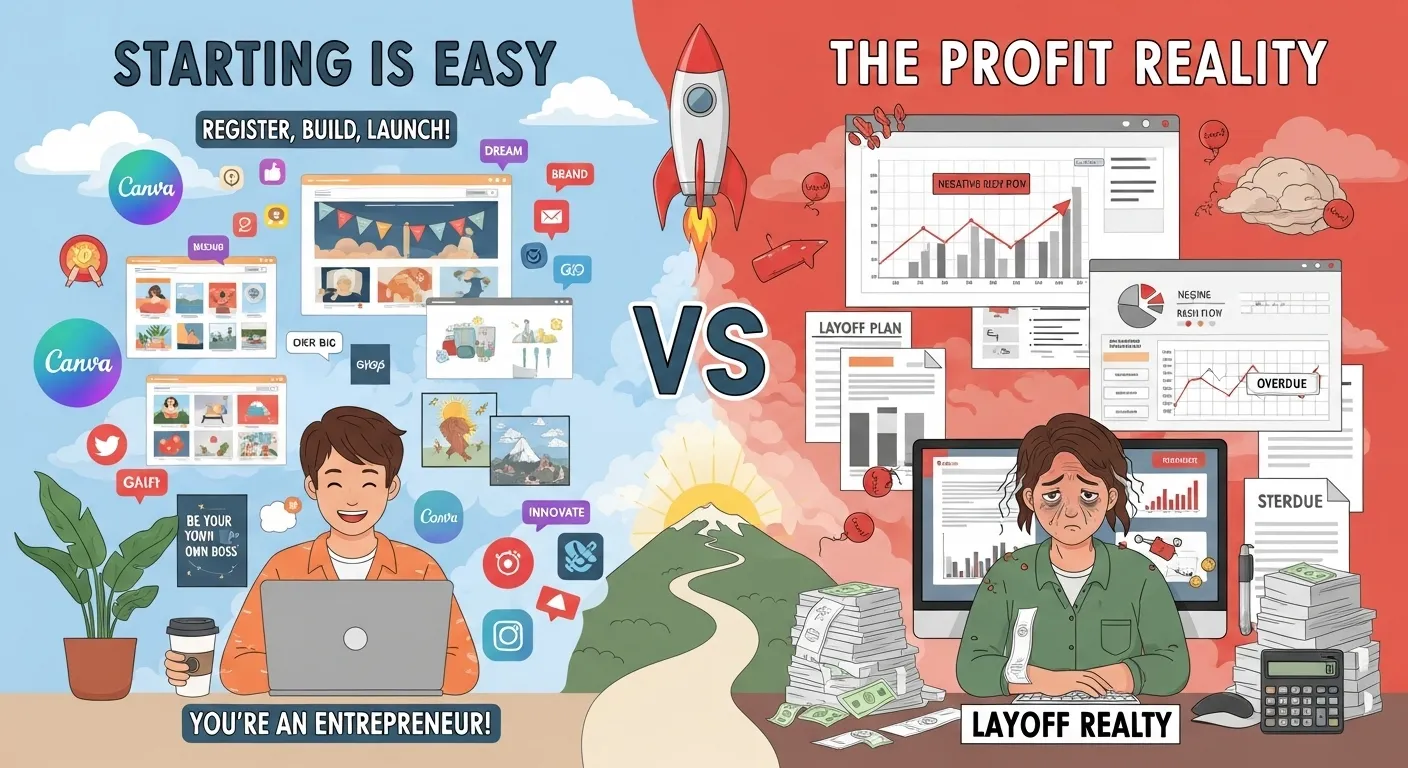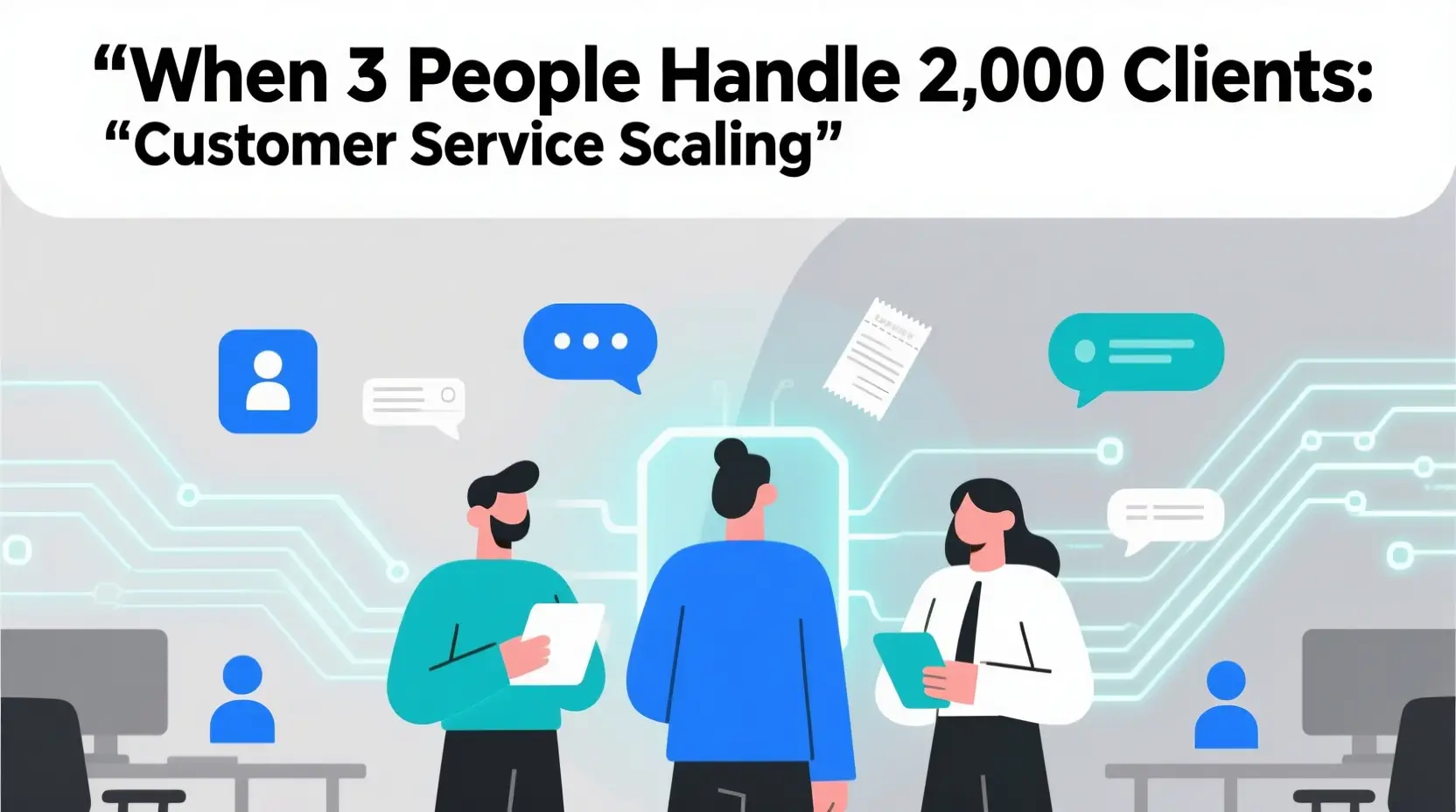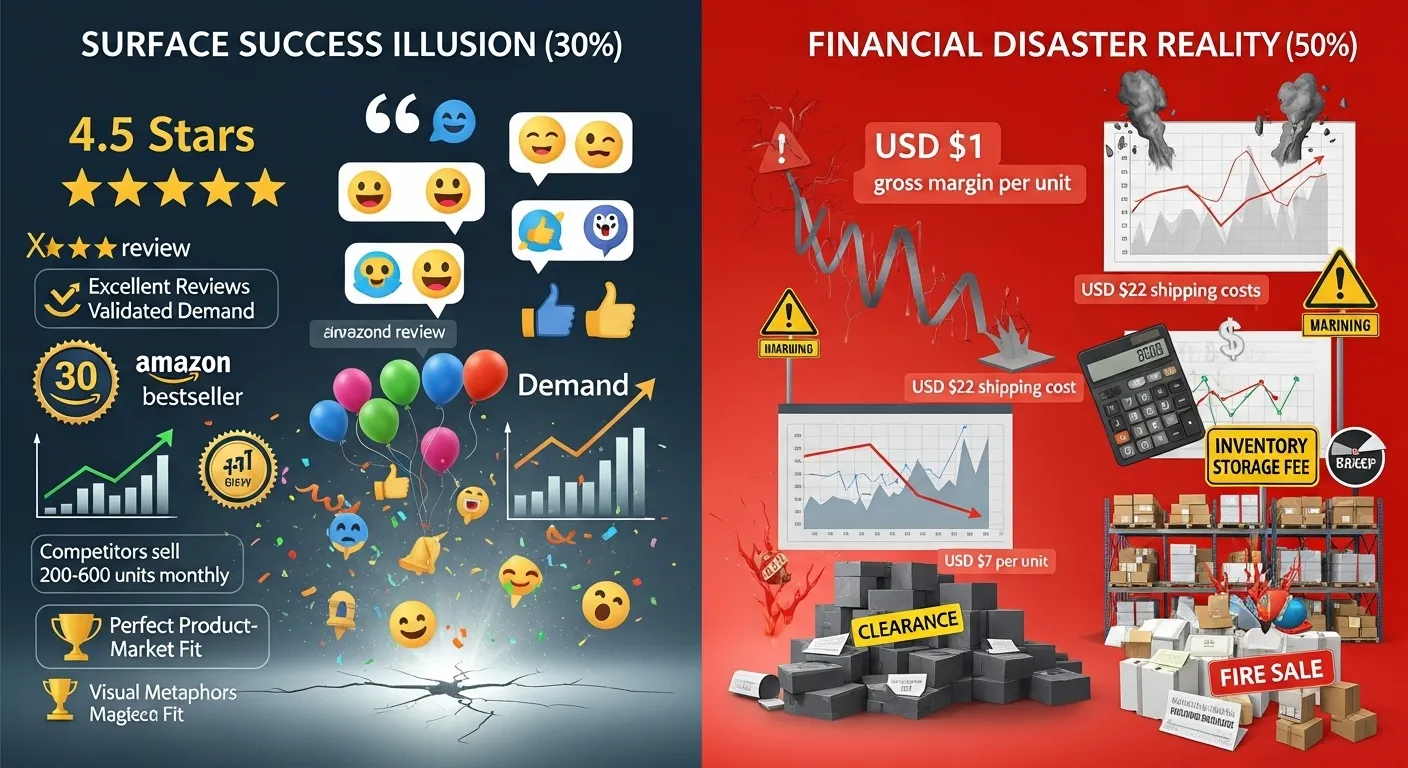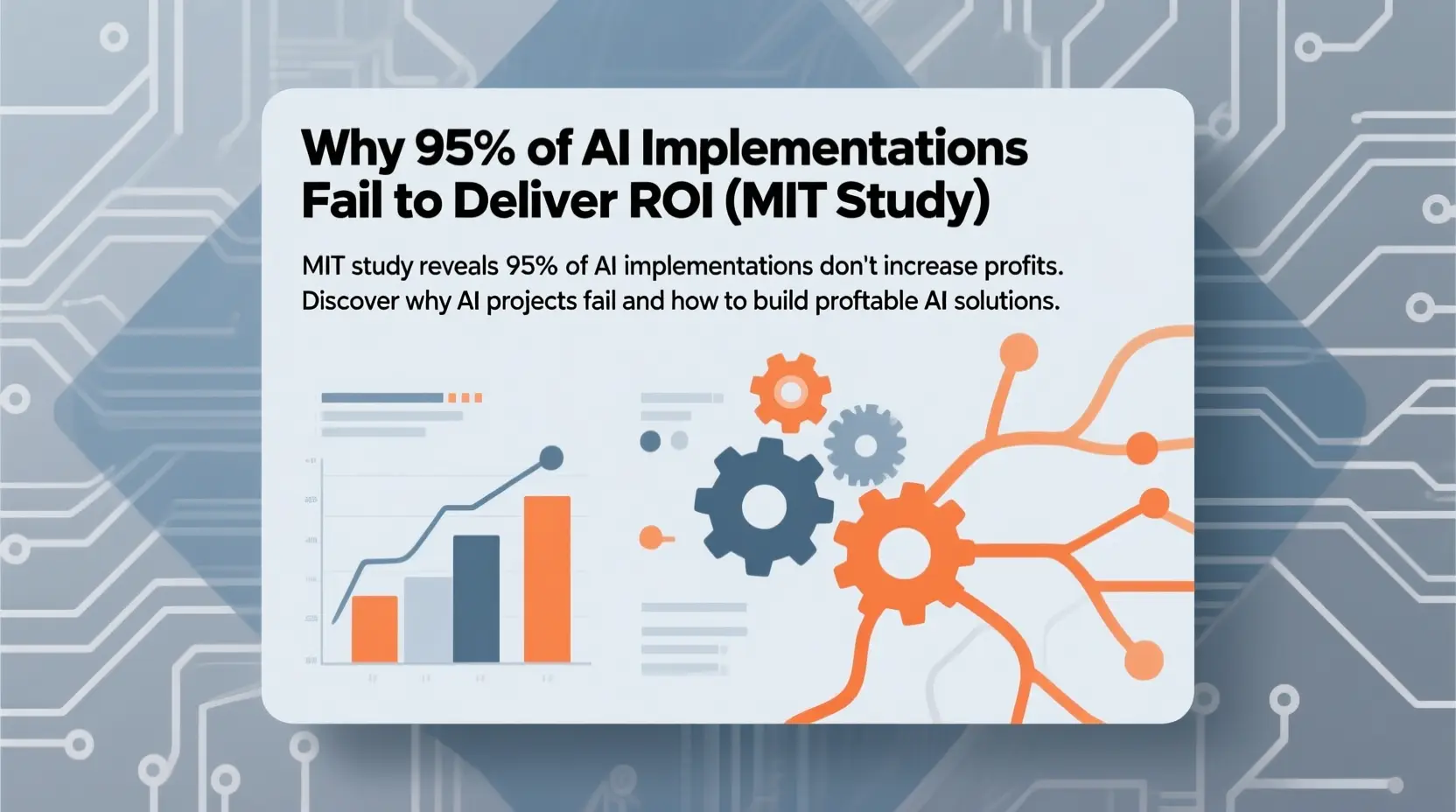The Hard Truth About Entrepreneurship: Why Making Money Is Nothing Like Starting a Business
A brutally honest post on Reddit recently laid bare the uncomfortable truth about entrepreneurship that most success stories conveniently omit: “Being an entrepreneur is easy. Until you try making money.”
The author’s breakdown resonates with anyone who’s moved beyond the romanticized startup phase into the grinding reality of sustainable business operations. Starting feels deceptively simple—register a name, build a website, design a logo on Canva, and suddenly you’re an entrepreneur. But making real profit? That’s when the comfortable illusions shatter against harsh economic reality.
The Deceptive Ease of Starting
The barrier to calling yourself an entrepreneur has never been lower. Modern tools make business creation accessible to almost anyone with internet access and a few hundred dollars. Domain registration takes minutes, website builders require no coding knowledge, and social media provides free marketing channels. The initial steps feel empowering and creative—choosing business names, designing logos, crafting mission statements.
This accessibility creates a dangerous misconception: that starting a business and running a profitable business require similar skill sets. They don’t. The first requires enthusiasm and basic execution. The second demands financial discipline, market understanding, and the emotional resilience to make uncomfortable decisions repeatedly.
The gap between these phases catches most entrepreneurs unprepared. The creative energy that fuels business launch doesn’t automatically translate into the systematic thinking required for profit generation. Many founders discover they’re better at starting things than sustaining them—a realization that often comes after significant time and money investment.
The Silent Bleed of Losses
Losing money in business happens gradually, then suddenly. Monthly expenses accumulate quietly—hosting fees, software subscriptions, inventory costs, marketing spend—while revenue remains uncertain or nonexistent. The early months feel manageable because losses seem temporary, part of the necessary investment phase that every business story includes.
But this bleeding becomes insidious because it’s predictable yet invisible. Unlike dramatic business failures that make headlines, most entrepreneurial struggles involve slow financial erosion that founders can rationalize for months or years. “We just need more time,” “The next quarter will be different,” “This is normal for startups”—these become mantras that mask deteriorating financial positions.
The psychological impact compounds the financial damage. Watching savings disappear while working harder than ever creates cognitive dissonance that many entrepreneurs struggle to process. The gap between effort invested and results achieved can be devastating for people who’ve always believed that hard work guarantees success.
The Brutal Reality of Profit Decisions
Generating profit requires fundamentally different thinking than launching a business. Where starting focuses on possibilities and potential, profitability demands brutal honesty about what’s actually working. This shift from optimistic creation to analytical optimization challenges many entrepreneurs’ core motivations.
The decisions that drive profitability often contradict the idealistic visions that inspired business creation. Firing employees means abandoning the dream of building a great workplace culture. Raising prices risks alienating customers who supported early growth. Discontinuing beloved products that don’t sell forces founders to admit their initial market assumptions were wrong.
These aren’t single, dramatic decisions but accumulating daily choices that gradually reshape the business. Each decision carries emotional weight because it represents compromise with the original vision. The entrepreneur who started with dreams of changing the world faces daily reality checks about what the market actually wants and will pay for.
The Compounding Effect of Small Decisions
What makes profitability particularly challenging is that it depends on getting many small decisions right consistently, rather than making one or two brilliant strategic moves. Pricing strategies, cost management, customer acquisition, product development, team structure—each area requires ongoing optimization that directly impacts financial performance.
The margin for error in profitable businesses is much smaller than in growth-focused startups. A funded startup can survive months of negative cash flow while iterating toward product-market fit. A bootstrapped business generating actual profit must maintain positive cash flow while making improvements, creating tension between stability and growth that funded companies don’t face as acutely.
The Emotional Toll of Financial Reality
The psychological shift from startup founder to profitable business owner involves grieving the loss of comfortable illusions about entrepreneurship. The inspiring narratives about following passion and changing the world give way to spreadsheets, cash flow projections, and difficult conversations about underperforming initiatives.
This transition often triggers what psychologists call “entrepreneurial depression”—a specific form of burnout that occurs when the reality of business operations conflicts with the motivations that inspired business creation. Unlike clinical depression, this condition stems from the gap between expectations and reality rather than chemical imbalances, but it can be equally debilitating.
Many entrepreneurs struggle with identity during this phase. The confident visionary who launched with bold plans must evolve into a cautious operator focused on sustainable growth. This isn’t failure—it’s maturation—but it feels like compromising core values and losing the entrepreneurial spirit that made starting feel exciting.
Learning to Embrace the Constraints
The entrepreneurs who successfully navigate the transition from startup to profitable business learn to find creativity within constraints rather than despite them. Instead of viewing profitability requirements as limitations on their vision, they discover that financial discipline can actually accelerate progress toward meaningful goals.
Resource constraints force innovation. When unlimited spending isn’t an option, entrepreneurs must find efficient solutions that often prove more sustainable than expensive alternatives. The pressure to generate profit with limited resources creates innovative approaches that wouldn’t emerge in well-funded environments.
Market feedback becomes clearer. Customers voting with their wallets provide unambiguous signals about value creation that surveys and focus groups can’t match. The discipline of generating profit forces entrepreneurs to understand what customers actually want rather than what they say they want.
Business models become sustainable. Companies that achieve profitability without external funding build business models that can survive market downturns, competitive pressures, and economic uncertainty. This sustainability provides freedom that heavily funded companies often lack.
The Strategic Advantages of Profitability Focus
While the transition from startup to profitable business feels constraining, it actually creates strategic advantages that many entrepreneurs don’t anticipate. Profitable businesses have operational flexibility that cash-burning startups lack, even when the startup has more total funding available.
Decision-making autonomy increases dramatically when business operations generate the cash needed for growth rather than depending on external investors. Profitable entrepreneurs can pursue opportunities that align with their values rather than investor expectations, creating authentic competitive advantages.
Market positioning becomes stronger when customers know they’re buying from financially stable companies. The ability to demonstrate profitability provides credibility that marketing messaging alone cannot achieve, particularly in B2B markets where purchasing decisions involve significant risk assessment.
Innovation capacity actually increases when profit provides sustainable funding for research and development. While external funding can provide larger initial budgets, profitable businesses can invest consistently in innovation without depending on fundraising cycles or investor approval for new initiatives.
Building Systems for Sustainable Growth
The entrepreneurs who successfully transition from starting to profiting develop systematic approaches to business operations that remove decision-making burden from daily operations. Rather than constantly choosing between competing priorities, they build frameworks that automate many profit-related decisions.
Financial dashboards that track key performance indicators in real-time eliminate the guesswork about business health that plagues many struggling entrepreneurs. When cash flow, customer acquisition costs, and lifetime value are visible daily, problems become apparent while solutions are still feasible.
Pricing strategies based on value creation rather than cost-plus calculations ensure that profitable businesses can invest in customer success while maintaining healthy margins. This strategic approach to pricing transforms what feels like constant financial pressure into sustainable competitive advantage.
Operational efficiency systems that eliminate waste and optimize resource allocation create the margin needed for both profitability and growth. These systems often involve difficult decisions about automation, outsourcing, or elimination of activities that feel important but don’t contribute to business outcomes.
The Paradox of Entrepreneurial Success
The most counterintuitive aspect of successful entrepreneurship is that making money often requires abandoning many of the activities that make starting a business feel exciting. The creative brainstorming, visionary planning, and inspirational team-building that characterize early-stage startups must give way to methodical execution, data-driven decision making, and sometimes uncomfortable leadership choices.
This paradox explains why many serial entrepreneurs start new businesses rather than focusing on scaling existing ones. The skills and motivations required for business creation differ significantly from those needed for profitable operations. Recognizing this difference allows entrepreneurs to either develop new capabilities or partner with people whose strengths complement their own.
The Reddit post that inspired this reflection captures a truth that success stories rarely emphasize: entrepreneurship isn’t just about having great ideas or working hard. It’s about developing the emotional and analytical capabilities needed to make decisions that prioritize long-term sustainability over short-term comfort.
Moving Beyond Startup Theater
The entrepreneurial journey from idea to profit forces a confrontation with market reality that many founders find more challenging than any technical or operational obstacle. The transition requires abandoning the comfortable narrative of the visionary entrepreneur pursuing their passion in favor of the less romantic but more sustainable identity of a business operator focused on creating measurable value.
This transition doesn’t diminish the importance of vision, creativity, or passion in entrepreneurship. Instead, it channels these qualities toward outcomes that customers value enough to pay for consistently. The entrepreneurs who make this shift successfully often discover that the constraints of profitability actually enable more meaningful impact than the unlimited possibilities of the startup phase.
The hard truth about entrepreneurship isn’t that making money is impossible or that passionate founders inevitably fail. It’s that sustainable business success requires evolving beyond the mindset that creates businesses toward the discipline that sustains them. This evolution is difficult, often uncomfortable, and rarely celebrated in entrepreneurial media—but it’s the difference between playing entrepreneur and being one.
The journey from startup founder to profitable business owner involves more than financial metrics—it requires fundamental changes in identity, decision-making, and values. Understanding this transition can help entrepreneurs prepare for the challenges while maintaining the passion that inspired their initial leap.



